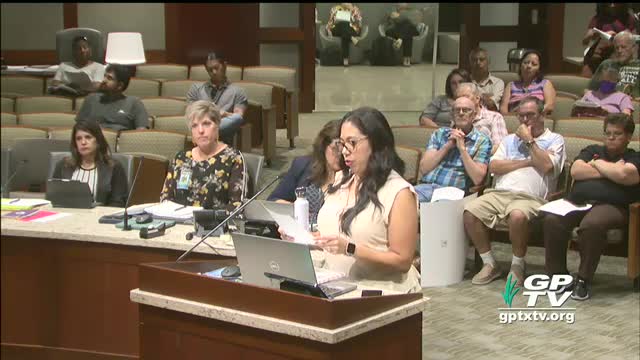City Council Faces Backlash Over Rising Solid Waste Rates
September 17, 2024 | Grand Prairie, Dallas County, Texas
This article was created by AI summarizing key points discussed. AI makes mistakes, so for full details and context, please refer to the video of the full meeting. Please report any errors so we can fix them. Report an error »

During a recent city council meeting, residents expressed concerns over rising financial burdens related to public improvement assessments and solid waste rates. A homeowner voiced strong objections to the proposed assessment of $2,846,504, arguing it disproportionately impacts homeowners. They suggested that the city should consider increasing taxes on large commercial properties instead, to distribute the financial responsibility more equitably.
City officials clarified that the Public Improvement District (PID) sets the assessment rates, not the city council, and encouraged residents to engage with PID board meetings for more transparency and involvement in budget discussions. The council emphasized that the PID is responsible for specific community maintenance tasks, such as managing ponds and water wells.
In another significant discussion, the council reviewed proposed solid waste rate increases of 7.5% for residential, commercial, and industrial services. This increase was negotiated down from an initial request of 10% from Republic Services. Council members raised concerns about the cumulative financial impact of these increases on homeowners, especially in light of potential water rate hikes.
The meeting also addressed the Zaza Hookah Lounge's specific use permit, which is up for renewal. Staff confirmed that the lounge is compliant with operational hours, despite previous confusion regarding its hours of operation. The council recommended renewing the permit while ensuring that signage accurately reflects authorized hours.
Additionally, a resident raised issues regarding the city's recent water quality problems, questioning the lack of support from state officials and the Texas Commission on Environmental Quality. They called for accountability and potential reimbursement for affected residents and businesses.
Overall, the meeting highlighted ongoing financial challenges for residents, the importance of community involvement in local governance, and the need for clear communication regarding city services and regulations.
City officials clarified that the Public Improvement District (PID) sets the assessment rates, not the city council, and encouraged residents to engage with PID board meetings for more transparency and involvement in budget discussions. The council emphasized that the PID is responsible for specific community maintenance tasks, such as managing ponds and water wells.
In another significant discussion, the council reviewed proposed solid waste rate increases of 7.5% for residential, commercial, and industrial services. This increase was negotiated down from an initial request of 10% from Republic Services. Council members raised concerns about the cumulative financial impact of these increases on homeowners, especially in light of potential water rate hikes.
The meeting also addressed the Zaza Hookah Lounge's specific use permit, which is up for renewal. Staff confirmed that the lounge is compliant with operational hours, despite previous confusion regarding its hours of operation. The council recommended renewing the permit while ensuring that signage accurately reflects authorized hours.
Additionally, a resident raised issues regarding the city's recent water quality problems, questioning the lack of support from state officials and the Texas Commission on Environmental Quality. They called for accountability and potential reimbursement for affected residents and businesses.
Overall, the meeting highlighted ongoing financial challenges for residents, the importance of community involvement in local governance, and the need for clear communication regarding city services and regulations.
View full meeting
This article is based on a recent meeting—watch the full video and explore the complete transcript for deeper insights into the discussion.
View full meeting
